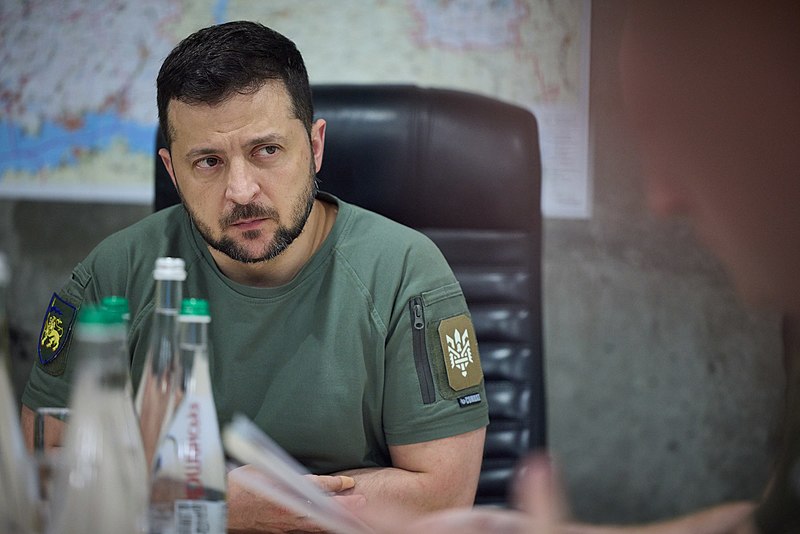Over the weekend, Ukrainian President Volodymyr Zelenskyy dismissed several of the country’s ambassadors who are overseas. Zelenskyy said that new candidates are being prepared to replace them.
Zelenskyy issued a statement Saturday announcing his dismissal of the ambassadors to Germany, India, Norway, Hungary, and the Czech Republic. In the statement, Zelenskyy added that the “rotation is a normal part of diplomatic practice” and that new candidates are being processed for the positions.
It remains to be seen whether the current ambassadors will be reassigned to new positions.
The dismissal also comes at a time when Ukraine’s relations with Germany are sensitive. This is especially as Germany is heavily dependent on Russian energy products and is also Europe’s biggest economy.
The current Ukrainian ambassador to Germany, Andriy Melnyk, is known to be very outspoken on social media and has often branded those who oppose arming Ukraine against Russia as appeasers.
One instance was when Melnyk accused German Chancellor Olaf Scholz of behaving like an “offended liver sausage” when Scholz did not immediately accept the invitation by Zelenskyy to visit Ukraine.
Ukraine and Germany are currently at odds over a German-made turbine that is being repaired in Canada. While Berlin wants Ottawa to return the turbine to the Russian natural gas firm Gazprom to pump gas into Europe, Kyiv said Canada should keep the turbine, saying that returning the turbine would be a violation of sanctions that have been imposed on Russia for its war on Ukraine.
Much to Kyiv’s objections, Canada announced on Saturday that it would be returning the turbine.
Meanwhile, US Secretary of State Antony Blinken said he discussed Russia’s invasion of Ukraine with his Chinese counterpart Wang Yi while raising concerns about Beijing’s alignment with Moscow. Both sides said their five-hour meeting, which took place a day after the G20 meeting in Indonesia, was “candid.”
“Despite the complexities of our relationship, I can say with some confidence that our delegations found today’s discussions useful, candid, and constructive,” said Blinken.
“I shared again with the state councilor that we are concerned about the PRC’s alignment with Russia, said Blinken, referring to China’s formal name, the People’s Republic of China.
Blinken added that he did not think Beijing was approaching the situation in a neutral manner as it supported Moscow in the UN and “amplified Russian propaganda.”



 TrumpRx Website Launches to Offer Discounted Prescription Drugs for Cash-Paying Americans
TrumpRx Website Launches to Offer Discounted Prescription Drugs for Cash-Paying Americans  India–U.S. Interim Trade Pact Cuts Auto Tariffs but Leaves Tesla Out
India–U.S. Interim Trade Pact Cuts Auto Tariffs but Leaves Tesla Out  Federal Judge Restores Funding for Gateway Rail Tunnel Project
Federal Judge Restores Funding for Gateway Rail Tunnel Project  Pentagon Ends Military Education Programs With Harvard University
Pentagon Ends Military Education Programs With Harvard University  New York Legalizes Medical Aid in Dying for Terminally Ill Patients
New York Legalizes Medical Aid in Dying for Terminally Ill Patients  Trump Lifts 25% Tariff on Indian Goods in Strategic U.S.–India Trade and Energy Deal
Trump Lifts 25% Tariff on Indian Goods in Strategic U.S.–India Trade and Energy Deal  Nighttime Shelling Causes Serious Damage in Russia’s Belgorod Region Near Ukraine Border
Nighttime Shelling Causes Serious Damage in Russia’s Belgorod Region Near Ukraine Border  Japan Election 2026: Sanae Takaichi Poised for Landslide Win Despite Record Snowfall
Japan Election 2026: Sanae Takaichi Poised for Landslide Win Despite Record Snowfall  Iran–U.S. Nuclear Talks in Oman Face Major Hurdles Amid Rising Regional Tensions
Iran–U.S. Nuclear Talks in Oman Face Major Hurdles Amid Rising Regional Tensions  Trump Endorses Japan’s Sanae Takaichi Ahead of Crucial Election Amid Market and China Tensions
Trump Endorses Japan’s Sanae Takaichi Ahead of Crucial Election Amid Market and China Tensions  Missouri Judge Dismisses Lawsuit Challenging Starbucks’ Diversity and Inclusion Policies
Missouri Judge Dismisses Lawsuit Challenging Starbucks’ Diversity and Inclusion Policies  South Korea Assures U.S. on Trade Deal Commitments Amid Tariff Concerns
South Korea Assures U.S. on Trade Deal Commitments Amid Tariff Concerns  U.S. Announces Additional $6 Million in Humanitarian Aid to Cuba Amid Oil Sanctions and Fuel Shortages
U.S. Announces Additional $6 Million in Humanitarian Aid to Cuba Amid Oil Sanctions and Fuel Shortages  Trump Signs Executive Order Threatening 25% Tariffs on Countries Trading With Iran
Trump Signs Executive Order Threatening 25% Tariffs on Countries Trading With Iran  TrumpRx.gov Highlights GLP-1 Drug Discounts but Offers Limited Savings for Most Americans
TrumpRx.gov Highlights GLP-1 Drug Discounts but Offers Limited Savings for Most Americans  U.S. to Begin Paying UN Dues as Financial Crisis Spurs Push for Reforms
U.S. to Begin Paying UN Dues as Financial Crisis Spurs Push for Reforms 































